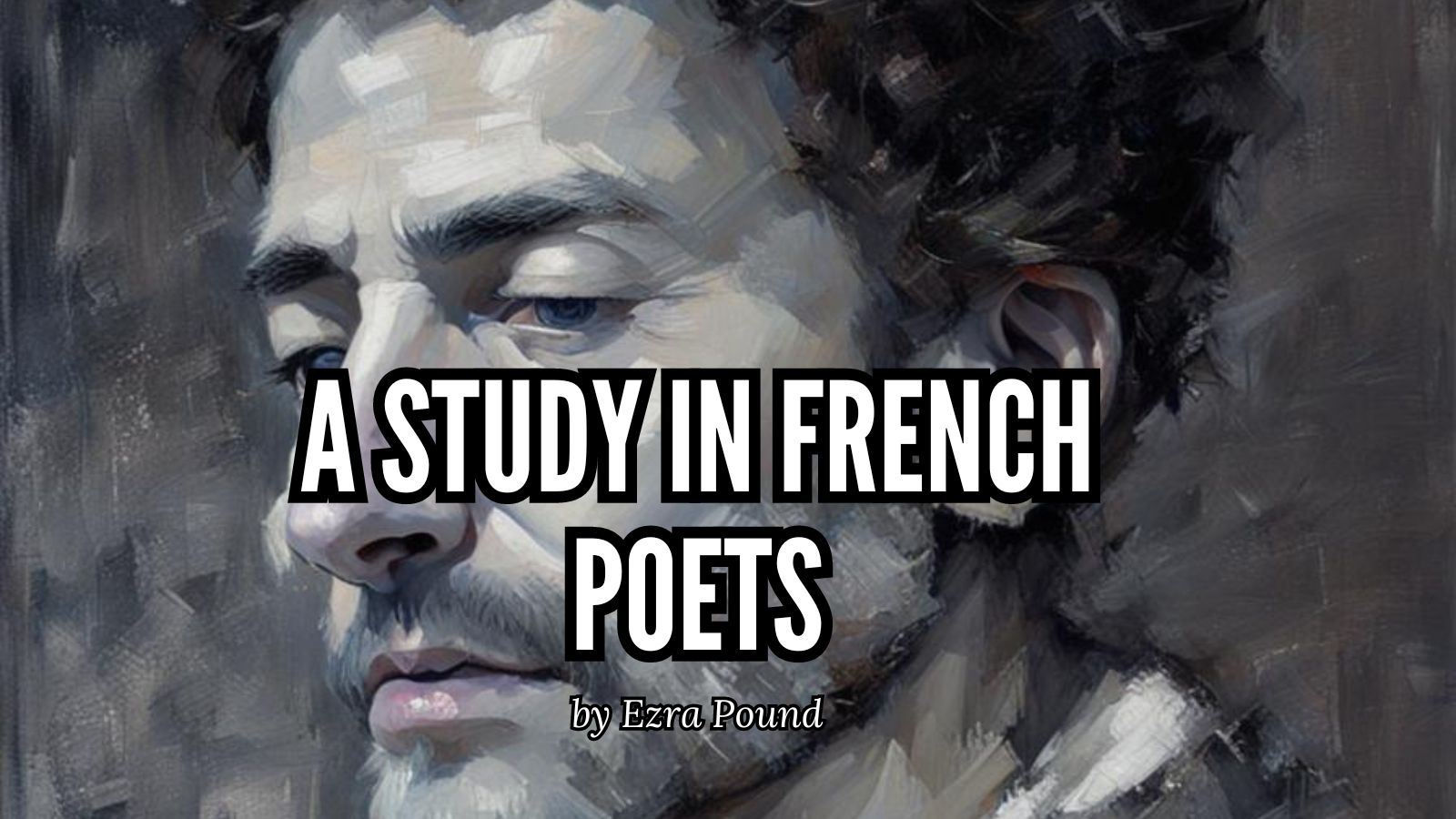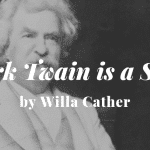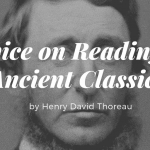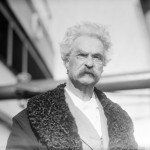A Study in French Poets
by Ezra Pound
The time when the intellectual affairs of America could be conducted on a monolingual basis is over. It has been irksome for long. The intellectual life of London is dependent on people who understand the French language about as well as their own. America’s part in contemporary culture is based chiefly upon two men familiar with Paris: Whistler and Henry James. It is something in the nature of a national disgrace that a New Zealand paper, “The Triad,” should be more alert to, and have better regular criticism of, contemporary French publications than any American periodical has yet had.
I had wished to give but a brief anthology[1] of French poems, interposing no comment of my own between author and reader; confining my criticism to selection. But that plan was not feasible. I was indebted to MM. Davray and Valette for cordial semi-permissions to quote the “Mercure” publications.
Certain delicate wines will not travel; they are not always the best wines. Foreign criticism may sometimes correct the criticism du cru. I cannot pretend to give the reader a summary of contemporary French opinion, but certain French poets have qualities strong enough to be perceptible to me, that is, to at least one alien reader; certain things are translatable from one language to another, a tale or an image will “translate”; music will, practically, never translate; and if a work be taken abroad in the original tongue, certain properties seem to become less apparent, or less important. Fancy styles, questions of local “taste,” lose importance. Even though I know the overwhelming importance of technique, technicalities in a foreign tongue cannot have for me the importance they have to a man writing in that tongue; almost the only technique perceptible to a foreigner is the presentation of content as free as possible from the clutteration of dead technicalities, fustian a la Louis XV; and from timidities of workmanship. This is perhaps the only technique that ever matters, the only mæstria.
Mediocre poetry is, I think, the same everywhere; there is not the slightest need to import it; we search foreign tongues for mæstria and for discoveries not yet revealed in the home product. The critic of a foreign literature must know a reasonable amount of the bad poetry of the nation he studies if he is to attain any sense of proportion.
He will never be as sensitive to fine shades of language as the native; he has, however, a chance of being less bound, less allied to some group of writers. It would be politic for me to praise as many living French-men as possible, and thereby to increase the number of my chances for congenial acquaintance on my next trip to Paris, and to have a large number of current French books sent to me to review.
But these rather broad and general temptations can scarcely lead me to praise one man instead of another.
If I have thrown over current French opinion, I must urge that foreign opinion has at times been a corrective. England has never accepted the continental opinion of Byron; the right estimate lies perhaps between the two. Heine is, I have heard, better read outside Germany than within. The continent has never accepted the idiotic British adulation of Milton; on the other hand, the idiotic neglect of Landor has never been rectified by the continent.
Foreign criticism, if honest, can never be quite the same as home criticism: it may be better or worse; it may have a value similar to that of a different decade or century and has at least some chance of escaping whims and stampedes of opinion.
I do not “aim at completeness.” I believe that the American-English reader has heard in a general way of Baudelaire and Verlaine and Mallarmé; that Mallarmé, perhaps unread, is apt to be slightly overestimated; that Gautier’s reputation, despite its greatness, is not yet as great as it should be.
After a man has lived a reasonable time with the two volumes of Gautier’s poetry, he might pleasantly venture upon the authors whom I indicate in this essay; and he might have, I think, a fair chance of seeing them in proper perspective. I omit certain nebulous writers because I think their work bad; I omit the Parnassiens, Samain and Heredia, firstly because their work seems to me to show little that was not already implicit in Gautier; secondly, because America has had enough Parnassienism—perhaps second rate, but still enough. (The verses of La Comtesse de Noailles in the “Revue des Deux Mondes,” and those of John Vance Cheney in “The Atlantic” once gave me an almost identical pleasure.) I do not mean that all the poems here to be quoted are better than Samain’s “Mon âme est une infante….” or his “Cléopatre.”
We may take it that Gautier achieved hardness in Emaux et Camées; his earlier work did in France very much what remained for the men of “the nineties” to accomplish in England. Gautier’s work done in “the thirties” shows a similar beauty, a similar sort of technique. If the Parnassiens were following Gautier they fell short of his merit. Heredia was perhaps the best of them. He tried to make his individual statements more “poetic”; but his whole, for all this, becomes frigid.
Samain followed him and began to go “soft”; there is in him just a suggestion of muzziness. Heredia is “hard,” but there or thereabouts he ends. Gautier is intent on being “hard”; is intent on conveying a certain verity of feeling, and he ends by being truly poetic. Heredia wants to be poetic and hard; the hardness appears to him as a virtue in the poetic. And one tends to conclude, from this, that all attempts to be poetic in some manner or other, defeat their own end; whereas an intentness on the quality of the emotion to be conveyed makes for poetry.
I intend here a qualitative analysis. The work of Gautier, Baudelaire, Verlaine, Mallarmé, Samain, Heredia, and of the authors I quote here should give an idea of the sort of poetry that has been written in France during the last half century, or at least during the last forty years. If I am successful in my choice, I will indicate most of the best and even some of the half-good. Bever and Léautaud’s anthology contains samples of some forty or fifty more poets.[2]
After Gautier, France produced, as nearly as I can understand, three chief and admirable poets: Tristan Corbière, perhaps the most poignant writer since Villon; Rimbaud, a vivid and indubitable genius; and Laforgue—a slighter, but in some ways a finer “artist” than either of the others. I do not mean that he “writes better” than Rimbaud; and Eliot has pointed out the wrongness of Symons’s phrase, “Laforgue the eternal adult, Rimbaud the eternal child.” Rimbaud’s effects seem often to come as the beauty of certain silver crystals produced by chemical means. Laforgue always knows what he is at; Rimbaud, the “genius” in the narrowest and deepest sense of the term, the “most modern,” seems, almost without knowing it, to hit on the various ways in which the best writers were to follow him, slowly. Laforgue is the “last word”:—out of infinite knowledge of all the ways of saying a thing he finds the right way. Rimbaud, when right, is so because he cannot be bothered to exist in any other modality.
From Instigations of Ezra Pound (1920)
- 100 Screenwriting Ideas to Get You Writing - January 20, 2026
- 100 Winter Storm Writing Prompts - January 17, 2026
- 100 Haunted House Story Starters: Craft Your Scariest Tale Yet - January 10, 2026




